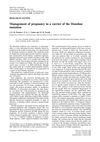 36 citations,
January 2017 in “Journal of Obstetrics and Gynaecology Research”
36 citations,
January 2017 in “Journal of Obstetrics and Gynaecology Research” The review found no clear link between vitamin D receptor gene variations and polycystic ovary syndrome.
 23 citations,
March 1994 in “Fertility and sterility”
23 citations,
March 1994 in “Fertility and sterility” Most patients improved with oral contraceptives, but some needed additional treatment.
 31 citations,
January 2017 in “Advances in Experimental Medicine and Biology”
31 citations,
January 2017 in “Advances in Experimental Medicine and Biology” Low testosterone and 5α-reductase inhibitors can harm men's metabolic and sexual health; testosterone therapy may help, but discussing 5α-RIs' side effects is important.
 5 citations,
November 1992 in “Current problems in dermatology”
5 citations,
November 1992 in “Current problems in dermatology” Glucocorticoids are powerful anti-inflammatory drugs that must be used carefully to avoid serious side effects.
 70 citations,
March 2010 in “The Journal of Steroid Biochemistry and Molecular Biology”
70 citations,
March 2010 in “The Journal of Steroid Biochemistry and Molecular Biology” Blocking a specific enzyme might help treat obesity and diabetes, but more research is needed to ensure it's safe.
 September 2023 in “bioRxiv (Cold Spring Harbor Laboratory)”
September 2023 in “bioRxiv (Cold Spring Harbor Laboratory)” FOL-026 peptide can help repair blood vessels and promote growth, offering potential treatment for vascular diseases.
 11 citations,
January 2020 in “Medical Journal Armed Forces India”
11 citations,
January 2020 in “Medical Journal Armed Forces India” Insulin resistance is a complex condition that can lead to many diseases and has few treatment options.
 2 citations,
February 2023 in “BMC endocrine disorders”
2 citations,
February 2023 in “BMC endocrine disorders” Curcumin improved some metabolic factors in women with PCOS but did not affect cholesterol, insulin, or testosterone levels.
 25 citations,
January 2013 in “International Journal of Trichology”
25 citations,
January 2013 in “International Journal of Trichology” Premature balding in some men may be linked to altered hormones, but it's not the male equivalent to polycystic ovary syndrome or metabolic syndrome.
 18 citations,
February 2010 in “Odontology”
18 citations,
February 2010 in “Odontology” The document concludes that Rabson-Mendenhall syndrome requires novel treatments for insulin resistance and emphasizes the importance of dental care in affected patients.

Diet and supplements can significantly affect acne, with some foods and nutrients reducing and others worsening it.
 24 citations,
January 2013 in “Indian Journal of Dermatology, Venereology and Leprology”
24 citations,
January 2013 in “Indian Journal of Dermatology, Venereology and Leprology” Hormonal treatment is effective for women with acne not helped by usual treatments, especially if they have hormonal imbalances.

Women with Polycystic Ovary Syndrome (PCOS) have a higher risk of developing type 2 diabetes due to insulin resistance.
 October 2023 in “IntechOpen eBooks”
October 2023 in “IntechOpen eBooks” Genes and epigenetic changes are important in the development of Polycystic Ovary Syndrome.
 11 citations,
April 2018 in “Nutrition Research”
11 citations,
April 2018 in “Nutrition Research” Chromium supplements don't help with weight loss or improve hormone and metabolism issues in people with polycystic ovary syndrome.
 2 citations,
November 2017 in “Elsevier eBooks”
2 citations,
November 2017 in “Elsevier eBooks” Different substances that activate or block the androgen receptor can affect male development and treat conditions like prostate cancer.
 December 2023 in “Journal of the Endocrine Society”
December 2023 in “Journal of the Endocrine Society” Blocking glucocorticoid receptors improves glucose metabolism in a PCOS mouse model.
 271 citations,
September 2008 in “Nutrition reviews”
271 citations,
September 2008 in “Nutrition reviews” Vitamin D receptor interacts with certain dietary components to help prevent diseases and regulate hair growth.
 15 citations,
October 2014 in “Hormone Molecular Biology and Clinical Investigation”
15 citations,
October 2014 in “Hormone Molecular Biology and Clinical Investigation” Some hair loss and prostate drugs might increase the risk of diabetes and heart disease.
 November 2013 in “John Wiley & Sons, Ltd eBooks”
November 2013 in “John Wiley & Sons, Ltd eBooks” Skin symptoms can indicate endocrine disorders and have various treatments.
 71 citations,
January 2015 in “The Scientific World Journal”
71 citations,
January 2015 in “The Scientific World Journal” Insulin resistance may contribute to various skin diseases and treating it could improve skin health and prevent more serious conditions.
 March 2009 in “Prenatal Diagnosis”
March 2009 in “Prenatal Diagnosis” Pregnancies in a woman with the Donohue mutation were managed with genetic testing, resulting in three healthy infants.
 August 2024 in “Indian Journal Of Clinical Practice”
August 2024 in “Indian Journal Of Clinical Practice” A balanced diet and healthy lifestyle help manage PCOS symptoms.
 146 citations,
January 2004 in “Hormones”
146 citations,
January 2004 in “Hormones” Human skin acts like a hormone-producing organ, making and managing various hormones important for skin and hair health.
 991 citations,
January 2011 in “Nature Reviews Endocrinology”
991 citations,
January 2011 in “Nature Reviews Endocrinology” The document concludes that PCOS is a complex disorder caused by both genetic and environmental factors, affecting women's health in various ways, and requires personalized treatment.
29 citations,
October 2020 in “Environmental health perspectives” Five preservatives may disrupt hormone function and need more health and environmental risk assessment.
 40 citations,
April 2008 in “European journal of endocrinology”
40 citations,
April 2008 in “European journal of endocrinology” Metformin and rosiglitazone both improved insulin use and hormonal symptoms in women with PCOS.
36 citations,
October 2015 in “Cell reports” Gab1 protein is crucial for hair growth and stem cell renewal, and Mapk signaling helps maintain these processes.
 138 citations,
July 2015 in “Clinical, Cosmetic and Investigational Dermatology”
138 citations,
July 2015 in “Clinical, Cosmetic and Investigational Dermatology” Eating less sugar, milk, and saturated fats and more vegetables and fish may help treat and prevent acne.
 305 citations,
February 2007 in “Hormone and metabolic research”
305 citations,
February 2007 in “Hormone and metabolic research” Human skin makes sexual hormones that affect hair growth, skin health, and healing; too much can cause acne and hair loss, while treatments can manage these conditions.




























